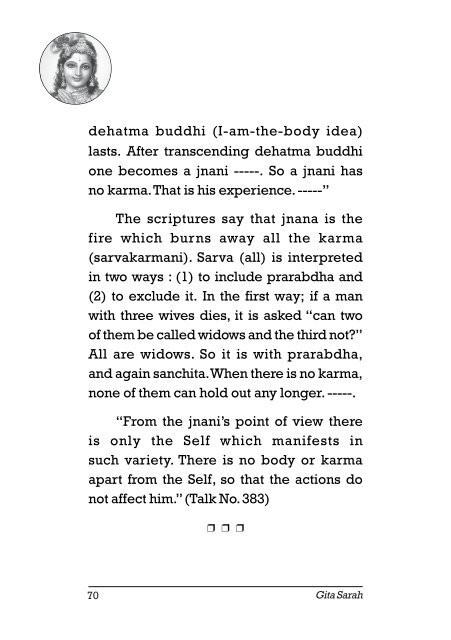Gita-Sarah-Commentary-on-the-Slokas-of-Bhagavad-Gita
Gita-Sarah-Commentary-on-the-Slokas-of-Bhagavad-Gita
Gita-Sarah-Commentary-on-the-Slokas-of-Bhagavad-Gita
You also want an ePaper? Increase the reach of your titles
YUMPU automatically turns print PDFs into web optimized ePapers that Google loves.
dehatma buddhi (I-am-<strong>the</strong>-body idea)lasts. After transcending dehatma buddhi<strong>on</strong>e becomes a jnani -----. So a jnani hasno karma. That is his experience. -----”The scriptures say that jnana is <strong>the</strong>fire which burns away all <strong>the</strong> karma(sarvakarmani). Sarva (all) is interpretedin two ways : (1) to include prarabdha and(2) to exclude it. In <strong>the</strong> first way; if a manwith three wives dies, it is asked “can two<strong>of</strong> <strong>the</strong>m be called widows and <strong>the</strong> third not?”All are widows. So it is with prarabdha,and again sanchita. When <strong>the</strong>re is no karma,n<strong>on</strong>e <strong>of</strong> <strong>the</strong>m can hold out any l<strong>on</strong>ger. -----.“From <strong>the</strong> jnani’s point <strong>of</strong> view <strong>the</strong>reis <strong>on</strong>ly <strong>the</strong> Self which manifests insuch variety. There is no body or karmaapart from <strong>the</strong> Self, so that <strong>the</strong> acti<strong>on</strong>s d<strong>on</strong>ot affect him.” (Talk No. 383)70<str<strong>on</strong>g>Gita</str<strong>on</strong>g> <str<strong>on</strong>g>Sarah</str<strong>on</strong>g>


